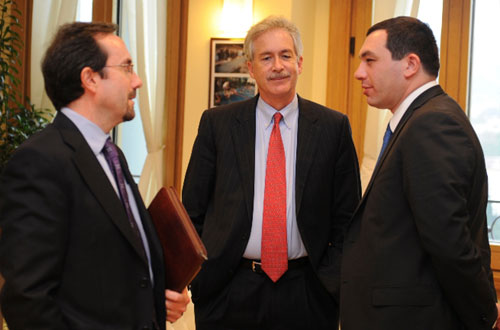U.S. Calls for Level Playing Field Ahead of Elections

U.S. Ambassador to Georgia John Bass (left); U.S. Deputy Secretary of State William J. Burns (middle) and Secretary of Georgia’s National Security Council Giga Bokeria in the presidential palace in Tbilisi before meeting with President Saakashvili. Photo: President’s press office.
The U.S. urges Georgia to reform its electoral code and to develop a level playing field for everyone in order to ensure “free and fair elections over the next two years so that there is a fully democratic transition of power in 2013,” U.S. Deputy Secretary of State, William J. Burns, said on October 19.
During the visit to Georgia as part of his trip to South Caucasus countries, Burns met with Georgia’s leadership, several representatives of opposition parties and civil society and also briefed a small group of selected reporters about his visit.
“The United States strongly supports the emergence of democratic institutions and a competitive political space in Georgia. We believe that it is deeply in the self-interest of Georgians, as you build a better and more promising future. Second, our focus is on the playing field and not on the players. In that sense, we believe it is extremely important for any democracy and any society, which is building democratic institutions, to focus on the importance of developing a competitive political landscape,” he said, according to an official transcript of his meeting with journalists.
Asked about a possible scenario in which after expiration of his second and final presidential term in 2013 President Saakashvili may become Prime Minister – a post which will concentrate much of the presidential powers after the new constitution goes into force in two years, Burns responded: “I would like to reinforce the point I made earlier. Our focus in the long-term is on the playing field and not on the players.”
“We believe that it is very important to ensure free and fair elections and an open and transparent electoral process over the next couple of years, so that what Georgians see in 2013 – a very important moment for Georgia’s democracy – is a fully democratic transition of power,” he said, according to an official transcript of his meeting with journalists.
For that reason, he continued, it was important for Georgia to focus on issues such as media freedom and creating level playing field to ensure that everyone plays with the same rules.
Reiterating U.S. strong support to Georgia’s NATO aspiration, the Deputy Secretary of State said, that strong democratic process was “in many ways one of the best advertisement for Georgia’s integration into the Euro-Atlantic community.”
“Georgia can invest in its future and make an even stronger case for itself on the value of integration into the Euro-Atlantic community by developing, over the next several years, the kind of democratic process that the people of Georgia deserve,” he said.
He also said that the U.S. was committed to broadening cooperation with Georgia in frames of strategic partnership treaty between the two countries.
“Secretary Clinton looks forward to visiting Georgia next year to strengthen the work of the [U.S.-Georgia Strategic Partnership] Commission,” Burns said.
Meeting with Opposition
During the visit the U.S. Deputy Secretary of State met with Irakli Alasania, leader of Our Georgia-Free Democrats; MP Giorgi Targamadze, leader of Christian Democratic Movement (CDM), Levan Berdzenishvili of Republican Party; Davit Gamkrelidze, leader of New Rights and Kakha Shartava, leader of National Forum.
Levan Berdzenishvili said after the meeting, that he told the U.S. Deputy Secretary of State, that the path of Georgia’s Euro-Atlantic integration did not go through “Mikheil Saakashvili’s permanent leadership”.
“If Georgia fails to change its government in 2012 [parliamentary elections], the country will never join either NATO or EU”, Berdzenishvili said.
Irakli Alasania, leader of Our Georgia – Free Democrats said that he raised the issue of “carrying out state extremism against a new player”. He also said that electoral environment in the country was also discussed in details.
Davit Gamkrelidze of New Rights party said that during “a very interesting and open discussion”; he said, that an electoral reform deal between the ruling party and some opposition parties was also discussed.
“He [William Burns] stressed that the United States will continue to support our country, our democracy and our people,” he told reporters.
Giorgi Targamadze, leader of Christian Democratic Movement, said that the U.S. Deputy Secretary of State, said that along with electoral issues, regional security was also discussed.
“The United States is our main partner in pursuing the non-recognition policy in respect of the separatist regions, but simultaneously political reforms, future elections are an integral part of security and stability in our country,” MP Giorgi Targamadze said.
Meeting with Saakashvili
After meeting with visiting U.S. Deputy Secretary of State, President Saakashvili’s press office said that “bilateral relations and the issues of boosting cooperation in frames of the Strategic Charter” were discussed. It said that Saakashvili and Burns also spoke about “the importance of democratic and economic reforms in the country”.
U.S. Ambassador to Georgia, John Bass; Secretary of the Georgian National Security Council Giga Bokeria and Deputy Foreign Minister Sergi Kapanadze, who is one of the Georgian negotiators in Russia’s WTO entry talks also attended the meeting. Bokeria held separate talks with William Burns earlier. Burns also met separately with Georgian Foreign Minister Grigol Vashadze.